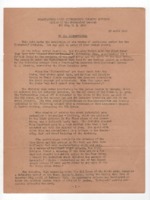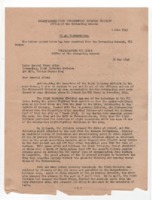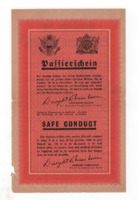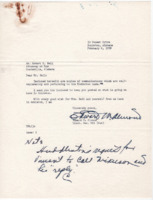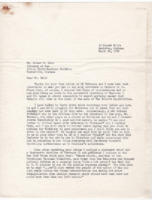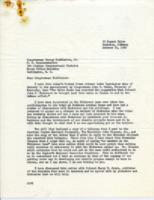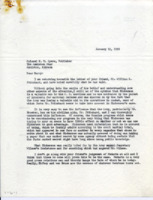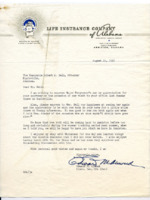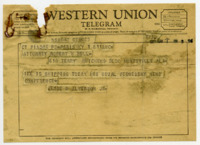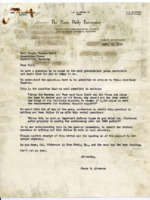
Browse Items (8239 total)
Sort by:
-
Letter from Maj. Gen. Terry Allen to the 104th Infantry "Timberwolf" Division.
In this letter, Allen describes the division's achievements in "six months of continuous combat," detailing its role in the liberation of the Netherlands and the capture of the Ruhr region and Cologne. Allen includes an excerpt from a letter from J. Lawton Collins. -
Letter from Lt. Gen. J. Lawton Collins commending the 104th Infantry "Timberwolf" Division for its role in capturing German territory at the end of World War II.
The letter was forwarded to all members of the division by Maj. Gen. Terry Allen of the 104th Infantry Division. Collins chronicles the Timberwolves' accomplishments in campaigns in western Germany, including the capture of Cologne and the Ruhr region. -
World War II safe conduct pass.
The pass notes, "The German soldier who carries this safe conduct pass is using it as a sign of his genuine wish to give himself up. He is to be disarmed, to be well looked after, to receive food and medical attention as required, and to be removed from the danger zone as soon as possible." -
Correspondence between Robert K. Bell and Edward M. Almond.
These letters include information pertaining to the Nickerson case. Almond expresses desire to "get something in motion to subdue the unnecessary and trivial expressions of � General Medaris". The letters also mention various correspondence that was included in the exchange of information. Both men advocate for the "cause" of Colonel Nickerson's actions. Bell was Nickerson's attorney during his trial. -
Letter to Robert K. Bell from Edward M. Almond.
Almond writes in reponse to Bell's February 18 letter regarding Medaris and other information of the Nickerson case. -
Correspondence between George Huddleston, Jr., Lieutenant General Edward M. Almond, and Carl Vinson.
Almond writes to Huddleston in an attempt to get Nickerson brought back from exile in Panama. Huddleston agrees with Almond in his response and says he will do his best to advocate for Nickerson's testimony on the missile program and will bring the matter to the attention of the Chairman, Honorable Carl Vinson. Huddleston's following letter of January 25, 1958 states that Carl Vinson does not believe having Nickerson as a witness is advisable. Huddlestone attaches a copy of Vinson's letter that explains this. Almond writes in response to the decision with his thoughts on the matter and believes that "all service officers will step gingerly in their testimony" so as not to "stick their necks out as General Gavin and Colonel Nickerson have already done." -
Letter to Harry M. Ayers from Edward M. Almond.
Almond writes to Ayers stating that he believes Nickerson is still a "valuable man to the U.S. services" and thanks Ayers for his interest in the matter. -
Letter to Robert K. Bell from Edward M. Almond.
This letter thanks Bell for the courtesy extended to Almond and Major Fergusson's visit to his office and expresses well wishes to Bell's wife. Almond details a few aspects of his stay in Huntsville in this letter. -
Telegram to Robert K. Bell from Jesse M. Alverson, Jr.
Alverson, publisher at The Paris Daily Enterprise, telegrams Bell about President Eisenhower. -
Correspondence between William J. Waugh and Jesse M. Alverson.
Alverson writes to Waugh to submit a question to the asked at the next presidential press conference along with a follow-up question. The question regards the President's opinion on the missile program and Colonel Nickerson's actions. Waugh responds that the Washington bureau will do what it can to get her questions answered.
